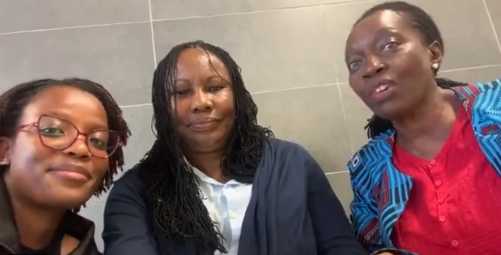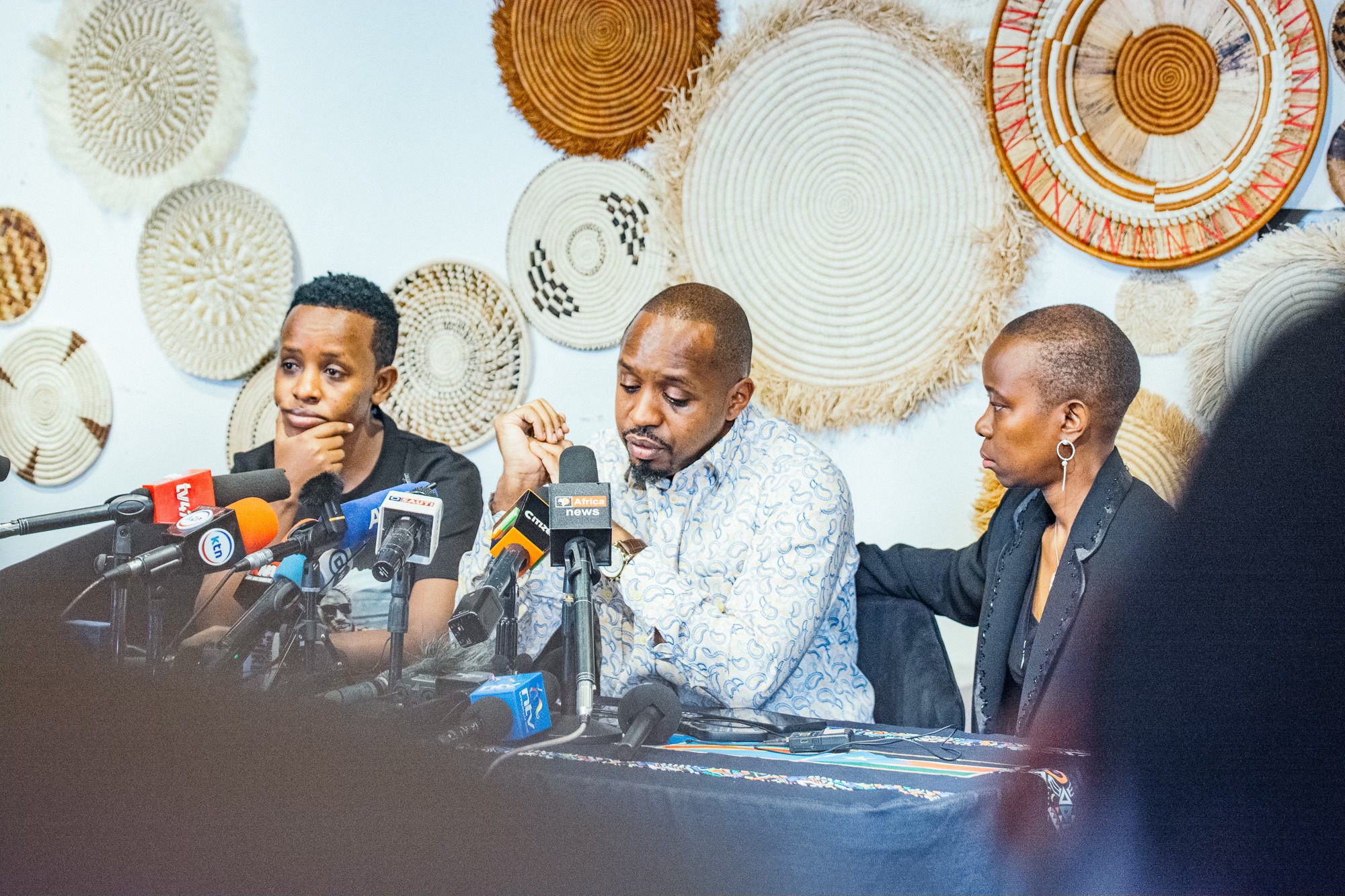 Martha Karua and other human rights defenders in Tanzania before they were deported.
Martha Karua and other human rights defenders in Tanzania before they were deported.East
Africa witnessed yet another alarming erosion of rule of law and disregard for
fundamental rights recently, when Martha Karua, former Minister for Justice,
was deported back to Kenya by the government of Tanzania alongside former Chief
Justice Dr Willy Mutunga, other lawyers and human rights defenders.
Afterwards, the Tanzanian authorities abducted human right activist Boniface Mwangi and Ugandan journalist Agather Atuhaire from their hotel rooms, tortured then and dumped them at their respective countries’ borders.
These courageous East Africans had travelled to observe the public trial of Tundu Lissu, the Tanzania’s opposition leader incarcerated on treason charges for advocating electoral reforms before the October presidential poll.
These deportations and torture, alongside Uganda’s unconstitutional court-martialling of civilians and Kenya’s state-driven abductions and extra-judicial killings, are unignorable testimonies to the collapse of constitutionalism in the region. But it is the illegal and politically motivated deportations and torture by Tanzania that delt one of the most devastating blows to the overarching East African integration cause.
The
deafening silence of the EAC Secretariat and the East African Legislative
Assembly (EALA) suggested willing complicity. Expected to jealously guard and
protect the Community Treaty, their inaction has squandered any remaining
public trust on their ability to stand up for East Africa, its founding values
and ultimate integration goals.
East Africa’s integration is premised on four key pillars: The Customs Union, Common Market, Monetary Union and the ultimate Political Federation.
The torture and deportations are an inexcusable violation of the very foundation upon which the integration is built – especially the Common Market Protocol (CMP), which guarantees free movement of goods, services, persons, labour and capital.
The tedious process of granting
Hon. Karua a law practising certificate in Uganda further undermines CMP’s
promise free movement of services. This is
in addition to other challenges facing the CMP including non-tariff barriers, inter-state trade
disputes, (e.g., between Kenya and Uganda on eggs and milk), and non-harmonisation across key areas such
as immigration, mutual recognition of academic and professional qualifications,
protection of cross-border investments, consumer protection, transport and communications.
The East African Monetary Union Protocol (EAMUP), ratified with ultimate goal of a single currency, is on life support. The four key pieces of legislation intended to actualise this dream have stalled. Tanzania has blocked the East African Statistics Bill over disagreements on qualifications of the director-general while Kenya and Burundi withhold assent to the Financial Services Commission Bill over substance and legal drafting style respectively.
The East African Monetary Institute Act remains unimplemented 6 years after its assent into law and the assent status of the Surveillance, Compliance and Enforcement Commission Bill remains publicly unknown. The Council of Ministers has not published any report on the status of implementation of the EAMUP, and neither has it given any credible indication on any challenges and way forward.
With the Council still deadlocked over the host country for the East African Monetary Institute (precursor to the envisaged East African Central Bank), Tanzania’s violation of the CMP puts into question its qualification to host such an important institution. What guarantees do Governors of central banks, heads of financial sector regulatory bodies, policy experts and other key stakeholders have, that Tanzania will not deport them even against diplomatic privileges, if they meet and make decisions that Tanzania disapproves of?
The fate of the political federation is similarly bleak. Some members have not domesticated the EAC treaty into national law or cleared their arrears from the joint obligations of running the Community.
Yet, despite non-contribution,
others continue to draw benefits from the Community’s resources while at the
same time denying key organs decision-making quorum.
Others joined the community expecting it to solve their domestic
security issues. They have now turned themselves into disinterested tag-alongs
who block decisions of a Community in which they have no interest anymore.
These are the consequences of a rapid and ill-advised expansion of the Community over the last 15 years. This expansion was clearly devoid of rigorous eligibility criteria and skipped critical steps such as “observer-membership”. This is particularly crucial so that candidates can fully acquaint themselves with the values, principles, objectives and workings of the Community before committing to membership.
 Boniface Mwangi with Ugandan journalist Agather Atuhaire. Photo/Facebook
Boniface Mwangi with Ugandan journalist Agather Atuhaire. Photo/FacebookIn settling domestic politics, some member states send to EALA Members with no interest in Community integration. Consequently, EALA has failed to sufficiently claim its place as the democratic grassroot driver of the integration. National superior courts, e.g., in Kenya, reject the primacy of Community law. This begs the question: What is the need for jurisprudence from the East African Court of Justice in the first place, if national judicatures do not feel bound by it?
The protocol on Good Governance, meant to strengthen democratic governance, remains unratified 13 years after drafting. This is a further testimony of the unwillingness by member states to integrate into a Community based on rule of law, accountability, transparency and respect for human rights. Indeed, the disregard for rights and freedoms exhibited in the deportations poses the question: How does anyone seriously expect Kenyans, who have lost life and blood fighting for the rights and freedoms they enjoy today, to allow themselves to be taken back to the dark days through some federal arrangements? There will and can be no federation in East Africa without respect for rule of law and protection of fundamental human rights and freedoms.
Only Uganda, Burundi and Kenya have held the prerequisite national consultations on the draft confederate constitution, seven years after appointment of a committee of experts. Ironically, Tanzania, which hosts EAC headquarters, and which stands to massively gain by hosting the administrative infrastructure of the (con)federation, sees no urgency in finalising its own consultations. But more worrying is the glaring opaqueness and lack of structured debates in this constitutional making process. None of the national consultations so far was open to general public. This clearly violates the EAC Treaty’s foundational principle of “people-centeredness”. Is this lack of transparency ab initio a deliberate strategy to already jeopardise the legitimacy and authority of any (con)federal authority before it is even established? Either way, it is absurd to expect East Africans to accept any so developed constitution, when they were denied the chance to meaningfully participate in its making.
The world’s major economies are heavily investing in technological innovation, science, research, and industrial modernization. Yet, East Africa remains entangled in poor governance, petty trade disputes and political repression that stifle dissent rather than promote debate for the best ideas to bring the Community forward. These distractions are a diversion from the bigger vision of the future we deserve: a strong, united, democratic, secure, prosperous, united, globally competitive East Africa. Leaders must urgently rise above national interests, deeply reflect on their countries’ position in the EAC and if their membership is still in their interest. And if the answer to that is in the affirmative, we, the East African citizens, expect a renewed resolve, bold commitment and tangible progress in integration; without fuss or quibble.
East
African citizens remain resilient, and determined, yearning for a united and
more integrated Jumuiya. They are ready to reboot Jumuiya to realise the
long-held dream of “One People, One Destiny”. For example, one Moses Haabwa from Uganda breathed short-lived life
into the long-cherished dream of a common currency by symbolically introducing
an imaginary Sheafra as the new currency. And while Mr. Haabwa’s Sheafra name
and design are debatable, his boldness is not only an inspiration to me and
millions of East Africans but a reflection of the region’s grassroot desire for
deeper integration. East African integration is no longer an elitist project.
Citizens are closely watching and will step up,
participate and own the integration process, whether the political and
bureaucratic leadership is ready or not.
Mugendi Nyaga (pictured) is an actuary, a management consultant and a public policy enthusiast focused on East African Community affairs.











